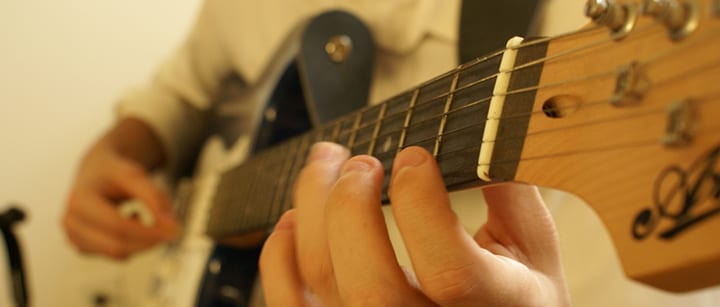Is it really necessary to learn guitar scales? If you’d rather just focus on chords and songs, you’re not alone. But here, Austin, TX teacher Samuel B. shares why practicing your scales will ultimately make you a better guitar player down the line…
I’m a 25-year veteran of playing the guitar. In seventh grade, I took an introductory class to both the guitar and keyboard, in which I received only a “B” as I pretty much neglected the keyboard altogether. Besides, I’d taken piano lessons already and was, by that time, more interested in portable instruments with strings and a neck as played by my musical heroes (i.e. Tom Petty and George Harrison).
A few years later, I purchased a hand-strengthening tool. I suppose I had in mind (for some reason) that I’d be able to use it to practice when an instrument wasn’t handy. Needless to say, the hand strengthener did not serve this specific purpose. I see nothing wrong with purchasing accessories (such as this one) provided that you understand their intended effect — strengthening your hand, in this case, rather than improving the fluidity of your playing.
As far as fluidity is concerned, nothing beats practicing your scales. I now introduce a relevant one for each of the first two sets of first-position chords you’ll learn (the ones in the key of C and the ones in the key of D, respectively). Beyond that, there’s more room for experimentation (particularly with blues progressions in E — the next key slated in the curriculum).
Scales serve multiple purposes:
1. They condition your fingers for playing chords.
Think of playing scales as warm-ups. As I type, I’m considering a relevant metaphor. One of the computer programs that taught us how to type in second grade (The Typing Teacher) focused on our recognition of the home-row keys (ASDF, JKL;) and the proper positions for pressing each. On the basis of our mastering the home row, we were subsequently taught the fingerings for the keys in the upper row as well as the lower one.
Along comparable lines, the C fingering is the same as that of its D counterpart a full step up the neck — just with (in this case) your use of four (not three) left-hand fingers to press the notes otherwise played openly. However, the comparison itself presents a pretty simple concept — that your mastery of one body of knowledge provides the basis for your branching out into mastering another.
Regarding both playing scales AND typing, I don’t even think about what I’m doing nowadays. As a matter of fact, I sometimes have to pick my brain a little when I help students learn guitar scales as I play the ones I know (the major and the blues scales predominantly) with natural ease. At some point, I also began sensing a correlation between the components of the chords in the key of E and the notes of the blues scale. I now play them interchangeably, which is another purpose served by scales — they are the foundation of improvisation.
2. Once mastered, a scale provides you with everything you need to launch a heartfelt solo — even one involving fewer than five notes.
From that point, the sky’s pretty much the limit. I even remember being prompted to play a ONE-note solo during a jazz band rehearsal. Without scale knowledge, though, I’d have had no basis for playing a solo whatsoever unless it simply involved picking out the notes comprising chords, which makes for pretty dull and predictable listening.
Here’s a great video that shows how a basic knowledge of scales can add some flair to even the most basic melodies.
3. Scales also serve as teaching tools for introducing music theory.
I’m quick to point out that the C scale (the first thing you’ll learn) is the only one that contains no sharps or flats. I even mention its relevance to the white piano keys periodically. A “Do a Deer” reference would work here too. Similarly, I tend to explain the basic building-blocks of major chords (the first, third, and fifth notes of the scale) and the half-step difference between major and minor ones (regarding the lowered third note in this case). You’ll also hear me mention the added seventh note in seventh chords (G7th in C for example).
As a teacher, I’ve found scale mastery to be the sole factor determining a student’s rate of progress. As you learn guitar scales, you’ll have a greater level of musical confidence. Just as your mastery of home-row keys determines your readiness for learning to type essays, your mastery of scales will serve as a cognitive lubricant welcoming upcoming knowledge and skills with aptitude and enthusiasm. Substitute “practice your scales” as the punchline to that old “How do you get to Carnegie Hall?” joke.
 Samuel B. teaches beginner guitar lessons in Austin, TX. He teaches lessons face-to-face without sheet music, which is his adaptation of Japanese instruction (involving a call-and-response method). Learn more about Samuel here!
Samuel B. teaches beginner guitar lessons in Austin, TX. He teaches lessons face-to-face without sheet music, which is his adaptation of Japanese instruction (involving a call-and-response method). Learn more about Samuel here!
Photo by Brian Finifter
Suzy S.

